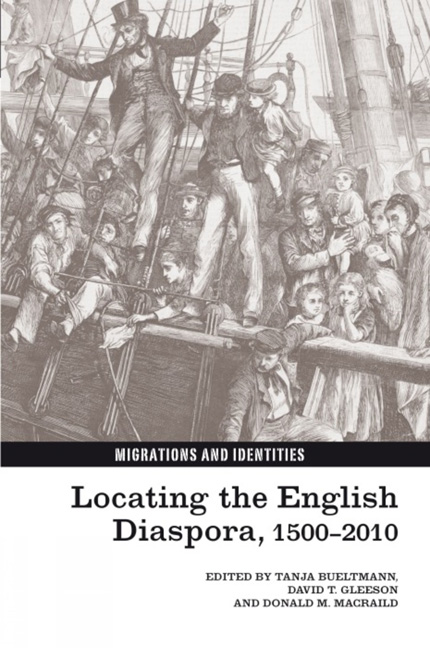Book contents
- Frontmatter
- Contents
- Notes on Contributors
- Introduction. Locating the English Diaspora: Problems, Perspectives and Approaches
- 1 Mythologies of Empire and the Earliest English Diasporas
- 2 The English Seventeenth Century in Colonial America: The Cultural Diaspora of English Republican Ideas
- 3 Fox Hunting and Anglicization in Eighteenth-Century Philadelphia
- 4 The Hidden English Diaspora in Nineteenth-Century America
- 5 An English Institution? The Colonial Church of England in the First Half of the Nineteenth Century
- 6 The Importance of Being English: English Ethnic Culture in Montreal, c.1800–1864
- 7 Anglo-Saxonism and the Racialization of the English Diaspora
- 8 ‘The Englishmen here are much disliked’: Hostility towards English Immigrants in Early Twentieth-Century Toronto
- 9 Cousin Jacks, New Chums and Ten Pound Poms: Locating New Zealand's English Diaspora
- 10 ‘Cooked in true Yorkshire fashion’: Regional Identity and English Associational Life in New Zealand before the First World War
- 11 Englishness and Cricket in South Africa during the Boer War
- 12 An Englishman in New York? Celebrating Shakespeare in America, 1916
- 13 The Disappearance of the English: Why is there no ‘English Diaspora’?
- Index
13 - The Disappearance of the English: Why is there no ‘English Diaspora’?
- Frontmatter
- Contents
- Notes on Contributors
- Introduction. Locating the English Diaspora: Problems, Perspectives and Approaches
- 1 Mythologies of Empire and the Earliest English Diasporas
- 2 The English Seventeenth Century in Colonial America: The Cultural Diaspora of English Republican Ideas
- 3 Fox Hunting and Anglicization in Eighteenth-Century Philadelphia
- 4 The Hidden English Diaspora in Nineteenth-Century America
- 5 An English Institution? The Colonial Church of England in the First Half of the Nineteenth Century
- 6 The Importance of Being English: English Ethnic Culture in Montreal, c.1800–1864
- 7 Anglo-Saxonism and the Racialization of the English Diaspora
- 8 ‘The Englishmen here are much disliked’: Hostility towards English Immigrants in Early Twentieth-Century Toronto
- 9 Cousin Jacks, New Chums and Ten Pound Poms: Locating New Zealand's English Diaspora
- 10 ‘Cooked in true Yorkshire fashion’: Regional Identity and English Associational Life in New Zealand before the First World War
- 11 Englishness and Cricket in South Africa during the Boer War
- 12 An Englishman in New York? Celebrating Shakespeare in America, 1916
- 13 The Disappearance of the English: Why is there no ‘English Diaspora’?
- Index
Summary
According to Eric Richards in his definitive book on British emigration, Britannia's Children (2004), between 1500 and 1900 some 20 million people emigrated from the British Isles, one of the largest diasporas ever known. Though many of them were Irish, Welsh or Scots, it is reasonable to assume that a substantial proportion of them were English. Yet there is little sense today of an English Diaspora. Unlike the Irish or the Scots, or even other ethnicities such as African, Armenian, Chinese, Indian, Greek, Gypsy, Korean, Lebanese, Palestinian or Vietnamese, no one discusses the English Diaspora. All those millions of Englishmen and women who emigrated over the centuries seem to have disappeared off the face of the earth. Where did they get to? What has become of them? Why did they not hold on to their identity in the same way as other groups? Why did they not create their own diasporic identity? Why, compared to other diasporas, has the English Diaspora been so little studied? Does this tell us something about the historical processes of the English Diaspora, or the implicit priorities of the contemporary academic construction of history? How important were factors such as the British Empire itself, or the nineteenth-century construction of ideas of race and ethnic identity, in the disappearance of the English? How do we reconcile the tendency for the English to be lost to sight once they had emigrated with the extensive writings on Englishness developed during the Victorian period? How is it, in short, that the English Diaspora has disappeared?
If you ask people about the English Diaspora, initially they typically assume that you are talking about ‘ex-pats’, groups of whom remain alive and well all over the world, holed up in bars along Hollywood Road in Hong Kong, or on the Victoria and Alfred waterfront in Cape Town watching the cricket or the rugby sevens. It seems that the English maintain their English identity only when they are temporarily exiled from the homeland. Once they actually emigrate, unlike the Irish and everyone else, they lose it.
- Type
- Chapter
- Information
- Locating the English Diaspora, 1500–2010 , pp. 222 - 235Publisher: Liverpool University PressPrint publication year: 2012



